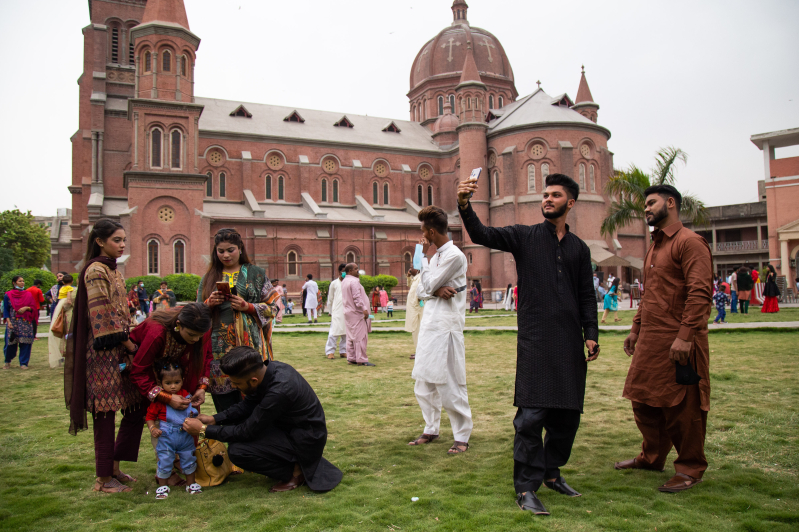
The Pakistan Bureau of Statistics released the census data on July 18, which stated the number of Christians had grown to 3.30 million in 2023 from 2.67 million in 2017 when the last census was conducted.
“Though the number of Christians has increased in the 2023 census, we believe that it still does not reflect our actual numbers. According to the latest official data, Christians make up 1.37 percent of the country’s total population of 241 million but we believe the percentage is much higher than the reported figures,” said National Council of Churches in Pakistan President Bishop Azad Marshall.
Marshall, who is also the president bishop of the Anglican Church in Pakistan, told Christian Daily International that Christians were settled across Pakistan whereas Hindus were mainly concentrated in the Sindh Province.
According to the 2023 census results, Hindus comprise 1.61 percent of the total population, making them the largest minority in the country for the third consecutive time.
“We firmly believe that Christians are the biggest minority group in the country with a majority of them living in the Punjab Province. According to our estimates, there are at least 3.5 million Christians in Punjab Province alone whereas we have a sizeable population in Sindh and KP provinces also,” he said.
The senior church leader said that several factors may have contributed to the inaccuracy of the data, including ignoring Christians living in small pockets across the country, incomplete filling of the census forms as a large number of Christians are not educated enough, general ignorance of Christians towards the importance of obtaining national identity cards and registering the birth of their children with the National Database and Registration Authority (NADRA), among other issues.
“However, we also cannot rule out hidden agendas behind the low numbers of the Christian population,” he emphasized, adding that underrepresentation would directly impact the political and social standing of Pakistani Christians.
“Undercounting can result in fewer opportunities for Christians to participate in the political process and advocate for their rights. It will also have an impact on education, better government jobs and healthcare services for our people. It may also further perpetuate the cycle of discrimination and marginalization, as our experiences and needs may not be adequately recognized or addressed by the state,” he said.
One workable solution to this recurring issue is conducting a self-enumeration campaign of Christians, he suggested.
“But to achieve this, all churches and faith-based organisations will have to pool their resources and work on a joint strategy. If we are able to do this, I think we will be in a much stronger position to contest the census results and demand our due share in state resources,” he said.
Archbishop Samson Shukardin, the president of the Catholic Bishops Conference of Pakistan, echoed Bishop Marshall’s concerns over the census results.
“We also believe that Christians have been grossly undercounted in this census as well. Pakistan’s population growth is the highest in the region yet after seeing the numbers of the Christian population it seems as if our community has stopped giving birth to children,” he told Christian Daily International.
The archbishop said that he believed that Christians’ actual numbers were being understated to avoid giving them due representation in the legislature and ministerial posts.
“We also stand to lose in the minority quotas for higher education and government jobs,” he added.
Shukardin said that the Catholic church has maintained its record of congregation members and urged other denominations to also ensure registration of their members.
“If all mainline churches and independent church ministries start registering their members we can have a data of our population to some extent,” he said.
Presbyterian Church of Pakistan’s Executive Secretary Rev Dr Majeed Abel endorsed Marshall’s suggestion for a self-enumeration drive.
“This campaign should comprise awareness campaigns at the grassroots level from the church platform. Our people need to understand the importance of registering themselves as it has a direct bearing on their socio-economic standing in Pakistan,” he said.
He added that such a campaign would also be an opportunity to build networks within the community, leading to joint efforts for advocacy for Christian rights.
Adeel Rehmat, the chief executive officer of Pakistan’s leading faith-based development organization Pak Mission Society, proposed that Christians should carry out their own census in four to five districts to verify the authenticity of the data collected by the government.
“If the figures do not match the government numbers, the census results can be challenged in the courts and a fresh census can be demanded from the government,” he said.
Rehmat said that during the census data collection they had received several complaints from Christians that they were not properly guided by the enumerators.
“One common complaint was that the enumerators did not inform the people about the religion section in the digital form. Moreover, there have been instances where Christians having local names were registered as Muslims without their knowledge. These are some of the key things that our people must be aware of in the next census,” he said.





